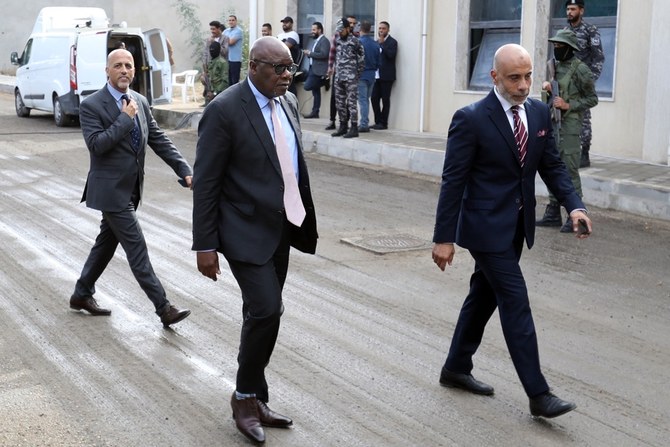
- ARAB NEWS
- 12 Jul 2025

TRIPOLI: The new UN envoy to Libya had hoped to usher in long-delayed elections, but his initiative is facing pushback from the eastern-based parliament and a lukewarm reception by its rivals in Tripoli.
Senegalese diplomat Abdoulaye Bathily told the UN Security Council last month he planned to create a panel tasked with delivering presidential and legislative elections in conflict-torn Libya later this year.
But his blunt criticism of the North African country’s two houses of parliament for failing to agree on a legal basis for elections has sparked a backlash that threatens to derail Bathily’s plans.
The pushback was “predictable,” said Khaled Al-Montasser, a professor of international relations at the University of Tripoli, as elections would see members of both chambers potentially lose their seats and privileges.
Despite the rivalry between them, both view the UN initiative as “interference in their sovereign decision-making power and an attempt to impose international will on Libyans,” Montasser told AFP.
Libya has seen more than a decade of stop-start conflict since the 2011 revolt that toppled strongman Muammar Qaddafi, with a myriad rival militias, foreign powers and multiple governments vying for influence.
The country remains split between a supposedly interim government in the western capital, Tripoli, and another in the east nominally backed by military chief Khalifa Haftar.
While most observers believe Libyans overwhelmingly support elections, bitter wrangling over the legal basis for holding them has been a key sticking point since the last major battle between Haftar and western Libyan forces in 2020.
Last month, the eastern-based House of Representatives passed an amendment to the country’s Constitutional Declaration — an interim constitution — which it said would provide a legal basis for elections.
Bathily, who was appointed as head of the UN’s Libya mission UNSMIL in October, said the amendment was “controversial” among Libyans and lacked clarity of key issues such as who may stand in presidential polls.
He also noted it had not been endorsed by the High Council of State, the Tripoli-based upper house of parliament.
The House in turn accused Bathily of “double standards” and “lacking impartiality“
Libyan analyst Abdallah Al-Rayes said the UN envoy’s initiative aimed to put pressure on rival Libyan factions by giving them a “last chance” before “a vote takes place without them.”
“The international community wants to embarrass the two chambers, who are masters in the art of wasting time and political horse-trading,” he said.
The Tripoli-based transitional government of Qaddafi-era tycoon Abdelhamid Dbeibah has signalled its willingness to cooperate with Bathily’s plan, asking the United Nations to provide logistical support to that end.
The US embassy last week called on “key Libyan leaders to approach the plan in a constructive spirit,” saying in an online post the UN proposal would “build on progress made between” the two chambers “on the legal basis for elections.”
Britain also said it supported the plan.
“Libyans deserve certainty and faith in their institutions,” its mission at the United Nations in New York tweeted shortly after Bathily had spoken at the Security Council.
“Conditions for elections must be agreed by all and the results respected.”
But Monstasser said US and British backing was “not enough,” stressing the importance of buy-in from their arch-rival Russia, which has a presence in southern Libya via the Kremlin-linked Wagner paramilitary group.
“Moscow is a powerful actor in Libya and exerts influence on Haftar,” he said.
Western Libyan efforts to prevent Haftar, a US citizen, from standing in presidential polls have been a key factor in the stalemate over the legal basis for polls.
Haftar’s rivals want rules that ban the candidacy of dual citizens and military figures.
Dbeibah summed up the fears of many in western Libya in a recent speech.
“A return to a military regime is unacceptable,” he said.
AFP